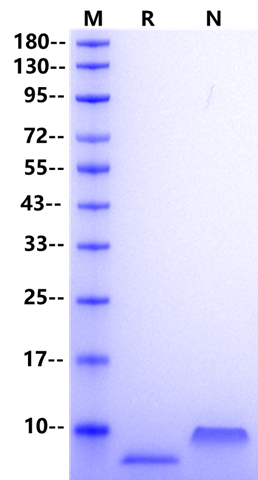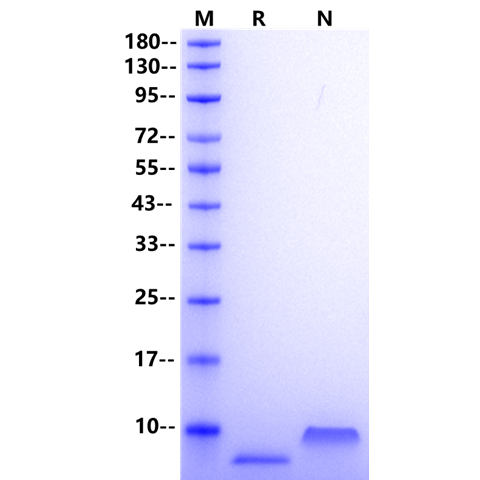1μg (R: reducing condition, N: non-reducing condition).
Product Details
Product Details
Product Specification
| Species | Human |
| Antigen | MIP-3α/CCL20 |
| Synonyms | CCL-20, CKb4, Exodus, LARC, MIP-3-alpha, MIP-3a, MIP3A, SCYA20, ST38, chemokine (C-C motif) ligand 20, C-C motif chemokine ligand 20 |
| Accession | P78556 |
| Amino Acid Sequence | Ala27-Met96 |
| Expression System | E.coli |
| Molecular Weight | 8kDa |
| Purity | >95% by SDS-PAGE |
| Endotoxin | <0.1EU/μg |
| Conjugation | Unconjugated |
| Tag | No Tag |
| Physical Appearance | Lyophilized Powder |
| Storage Buffer | PBS, pH7.4 |
| Reconstitution | Reconstitute at 0.1-1 mg/ml according to the size in ultrapure water after rapid centrifugation. |
| Stability & Storage |
· 12 months from date of receipt, lyophilized powder stored at -20 to -80℃. · 3 months, -20 to -80℃ under sterile conditions after reconstitution. · 1 week, 2 to 8℃ under sterile conditions after reconstitution. · Please avoid repeated freeze-thaw cycles. |
| Reference | 1. Kwantwi LB, Wang S, Sheng Y, Wu Q. Multifaceted roles of CCL20 (C-C motif chemokine ligand 20): mechanisms and communication networks in breast cancer progression. Bioengineered. 2021 Dec;12(1):6923-6934. |
Background
Macrophage Inflammatory Protein-3 (MIP-3α), also known as chemokine (C-C motif) ligand 20 (CCL20) or liver activation regulated chemokine (LARC), is the only chemokine ligand for C-C motif chemokine ligand-receptor 6(CCR6), and is a member of the CC family and the alpha subfamily chemokines. Structurally, CCL20 contains four exons and three introns at their junctions which differ from other members of the CC chemokines. Chemokines are well known to play essential roles in the recruitment of immune cells and the development of lymphoid tissues. They also regulate the recruitment and trafficking of leucocytes during homeostasis and inflammation. Inflammatory chemokines are released to induce leukocyte infiltration to inflammatory site. Beyond these physiological roles, emerging studies have highlighted the indispensable role of chemokines and their receptors in tumor progression. It has become evident that chemokines regulate several oncogenic processes, including host immune response, tumor growth, angiogenesis, metastasis and chemoresistance.
Picture
Picture
SDS-PAGE



